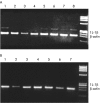Increased rectal mucosal expression of interleukin 1beta in recently acquired post-infectious irritable bowel syndrome
- PMID: 12631663
- PMCID: PMC1773606
- DOI: 10.1136/gut.52.4.523
Increased rectal mucosal expression of interleukin 1beta in recently acquired post-infectious irritable bowel syndrome
Abstract
Background and aims: Chronic bowel disturbances resembling irritable bowel syndrome (IBS) develop in approximately 25% of patients after an episode of infectious diarrhoea. Although we have previously shown that psychosocial factors operating at the time of, or prior to, the acute illness appear to predict the development of post-infectious IBS (PI-IBS), our finding of an increased inflammatory cell number in the rectum persisting for at least three months after the acute infection suggested that there is also an organic component involved in the development of PI-IBS. To evaluate this further, we measured expressions of interleukin 1beta (IL-1beta) and its receptor antagonist (IL-1ra) in these patients to provide additional evidence that the pathogenesis of PI-IBS is underpinned by an inflammatory process.
Methods: Sequential rectal biopsy samples were prospectively obtained during and three months after acute gastroenteritis, from eight patients who developed post-infectious IBS (INF-IBS) and seven patients who returned to normal bowel habits after acute gastroenteritis (infection controls, INF-CON). Eighteen healthy volunteers who had not suffered from gastroenteritis in the preceding two years served as normal controls (NOR-CON). IL-1beta and IL-1ra gene expressions were assayed by reverse transcriptase-polymerase chain reaction, and their levels of expression were quantitated by optical densitometry after electrophoresis on agarose gel.
Results: INF-IBS patients exhibited significantly greater expression of IL-1beta mRNA in rectal biopsies than INF-CON patients both during and three months after acute gastroenteritis. Moreover, IL-1beta mRNA expression had increased in biopsies taken from INF-IBS patients at three months after the acute infection but no consistent change was observed in INF-CON patients. IL-1beta mRNA expression of INF-IBS patients at three months post gastroenteritis was significantly greater than NOR-CON whereas that of INF-CON patients was not significantly different from NOR-CON. Despite these differential changes in IL-1beta mRNA expression, no significant changes were observed in IL-1ra mRNA expression among the three groups.
Conclusions: These findings indicate that those patients who develop IBS post infection exhibit greater IL-1beta mRNA expression, both during and after the infection, compared with individuals who do not develop PI-IBS. We conclude that such patients may be susceptible to inflammatory stimuli, and that inflammation may play a role in the pathogenesis of PI-IBS.
Figures



References
-
- Gwee KA, Graham JC, McKendrick MW, et al. Psychometric scores and development of irritable bowel after infectious diarrhoea. Lancet 1996;347:150–3. - PubMed
-
- Barbara G, Vallance BA, Collins SM. Persistent intestinal neuromuscular dysfunction after acute nematode infection in mice. Gastroenterology 1997;113:1224–32. - PubMed
Publication types
MeSH terms
Substances
Grants and funding
LinkOut - more resources
Full Text Sources
Other Literature Sources
Medical
Research Materials
Miscellaneous
